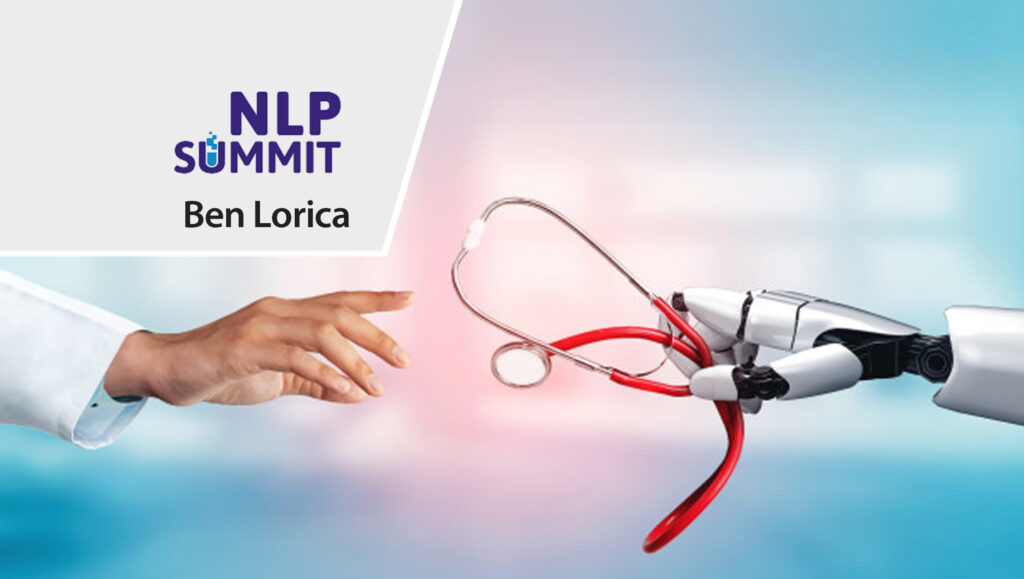Artificial Intelligence (AI) is revolutionizing enterprise and consumer technology as we know it, but few industries have made strides as significant as healthcare and life sciences. With its growing applications in the field, NLP is empowering hospitals, health systems, and businesses alike to accelerate research and care. From accelerating clinical trial recruitment and vaccine development, to detecting potentially life-threatening adverse drug events and forecasting hospital gridlock/staffing demands, AI is making an impact beyond the headlines.
Even in its infancy, the global AI in healthcare market size and investments in AI technologies, like Natural Language Processing (NLP), have experienced significant growth, even in the wake of pandemic-driven budget cuts. This trajectory is exciting to watch and expected to continue over the next several years, as we’ve only scratched the surface of AI’s potential. But understanding how organizations are applying these technologies, who is using them, and the challenges and breakthroughs they’re seeing in practice is vital to continuing progress in the field.
A new Gradient Flow survey, in collaboration with John Snow Labs, seeks to answer these questions and shed light on the state of AI in healthcare today. The global survey, queried users from nearly 50 countries worldwide, with more than a quarter of respondents holding technical leadership roles. From this research emerged 5 key findings that enterprise organizations should keep in mind as they plan to work with customers in the healthcare/life sciences space or embark on healthcare AI journeys of their own.
NLP, BI, and Data Integration Named Foundational AI Technologies
When asked what technologies they plan to have in place by the end of 2021, close to half of respondents cited data integration, while one-third cited NLP and business intelligence, respectively among the technologies they are currently using or plan to use by the end of the year. Additionally, more than one third of Technical Leaders indicated that their organizations are using—or will soon be using—data annotation tools and data science platforms. It’s clear that healthcare organizations are getting serious about putting their data to use, made easier by the advent of electronic medical records and technologies like NLP that serve as a connective tissue to make sense of siloed data sources to paint a complete picture. For example, not only can NLP compile information from EHRs, but also free-text and images such as X-Rays or other diagnostic tests that would otherwise be hard to piece together.
Patients and Clinicians are Becoming the Primary Users of AI Applications
As AI moves from research to production, survey results demonstrate a shift from use by data scientists and technical personnel to clinicians and patients. When asked who the intended users are for AI tools and technologies, more than half of all respondents signaled clinicians among their target users. Of mature organizations, those classified as having extensive AI experience, 59% indicated that patients were also users of AI technologies. This further exemplifies the democratization of AI technology in healthcare and the many applications it can provide in a clinical setting. Chatbots and other interactive and automation technologies will only grow as AI matures. This is profound for delivering patient care, as it provides a level of access and convenience that makes it easier for people to schedule appointments, get a hold of records they need, and even manage their care remotely.
Open-Source Software is the Fan Favorite
The most popular forms of software being used to build AI solutions in healthcare are open-source (53%) and public cloud providers (42%). It’s not surprising that open-source solutions are inching ahead of cloud providers, as data privacy and security have emerged as key challenges for cloud service adoption. This can be especially poignant in industries such as healthcare and financial services, in which laws and regulations may prohibit them from sharing third-party data. Privacy regulations in healthcare, for example, require that users strip medical records of any protected health information through a process called de-identification. What was once a largely manual and labor-intensive process, open-source NLP software has helped automate this task.
Mature Companies are Building Instead of Buying
Companies who have experience deploying models to production very wisely choose to rely on their own data and monitoring tools rather than third-party evaluation or the representation of software vendors. In contrast, companies who are still in the early stages of exploring AI are more open to evaluation metrics provided by software vendors. This makes sense both from a regulatory perspective and to satisfy the unique set of needs for the very nuanced healthcare industry. For example, different hospitals or insurance companies may have different billing codes, medical jargon, or processes that make it difficult to implement out-of-the-box solutions. Using models tailored to one’s specific needs, while also keeping data within the organization is a smart move for those who have the tools to keep their AI efforts in-house.
Users Get Clear on Criterion for Solutions, Models, and Partners
According to the survey results, technical leaders value state-of-the-art accuracy (48%), no data sharing with software vendors (44% considered this very important), and the ability to train their own models (42%) when evaluating machine learning, NLP, or computer vision solutions. When it comes to key criteria for evaluating locally installed software libraries or SaaS solutions, healthcare-specific models and algorithms (42%) and having a production-ready codebase (40%) top the list. In selecting a consulting company to work with, expertise in healthcare data engineering, integration, and compliance (41% considered this Very Important) and no sharing or derivative rights of the data or code (45%) were the most important to technical leaders. What this tells us is that solutions that meet the specific needs of the healthcare industry, and prioritize accuracy and compliance will be the winners in this space.
Read More : SalesTechStar Interview with Scott Lasica, Chief Sales Officer at Stream
With the increased investment and interest in areas such as NLP, BI, and data integration, it’s encouraging to see how a highly-regulated industry like healthcare is applying innovative technology to advance research and improve care. While balancing responsible practices and data privacy requirements is a challenge, technical leaders have made it clear that the solutions they choose to implement will be market leaders in these areas.




















